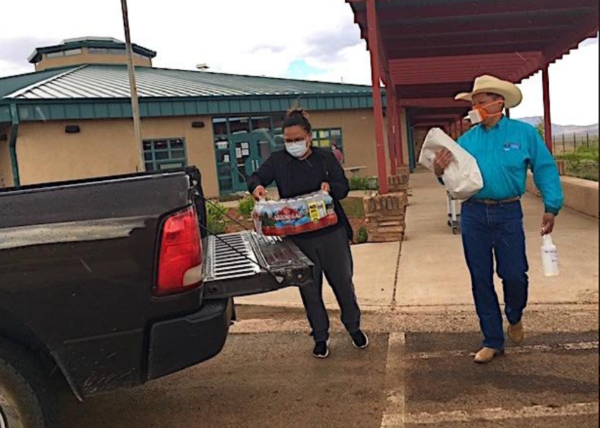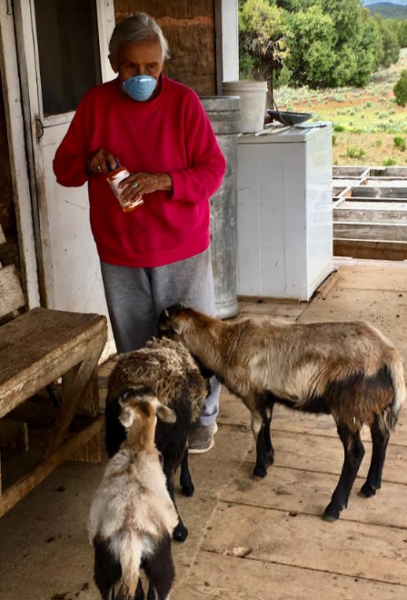
- Details
- By Native News Online Staff
CRYSTAL, N.M. – When the pickup truck pulled into a remote mountain home near Crystal, New Mexico last week, a young cow, three sheep and a herd of puppies followed Myrtle Hermes as she stepped out on her porch to greet visitors.
Wearing a protective mask, Hermes welcomed Navajo Nation Council Delegate Wilson Stewart, Jr. and Louise Q. Mark, Crystal’s Senior Program supervisor, who brought food, water, dog food and canned goods. After introducing themselves in Navajo, Hermes said she was grateful that a council delegate came to check on her family and bring supplies for the first time in 60 years.
Hermes is the granddaughter of the early Navajo leader Chee Dodge. She inherited the family’s sprawling homestead in the Chuska Mountains established in the late 1800s. With son Virgil’s help, Myrtle and her husband, Art, have been at home caring for their livestock and land.
She said she had heard about coronavirus — “Dikos Ntsaaigii-Nahast’eits’aadah” (translated as “Big Flu 19”) — on KTNN radio and from family, so she follows precautions to stay home, wash hands and wear a mask around others. No cases of coronavirus have been found in Crystal, but at least 301 cases were reported in surrounding Fort Defiance Agency.
 Myrtle Hermes and her Barby blackbelly sheep on the porch of her home in the Chuska Mountains.
Myrtle Hermes and her Barby blackbelly sheep on the porch of her home in the Chuska Mountains.
Within the 17 million-acre Navajo Nation, council member Stewart represents four communities with roughly 12,000 people on the New Mexico/Arizona state line. Many families in these areas live on rough dirt roads in forested mountains with the nearest town for groceries more than 50 miles away. The Navajo Nation has been in lockdown for two months, including 57-hour weekend curfews that were just lifted this week, making it impossible for some families to get food and basic supplies.
“A lot of our sheepherders and families with livestock haven’t received any donations because of their remote locations,” said Stewart, who makes several deliveries each week as supplies come in. “They don’t hear the announcements or don’t have transportation, so we work with our chapters, grazing officials and senior programs to find families living far off-road and those who can’t travel for food and supplies. We’re trying to help our people as much as we can.”
During the COVID19 pandemic, Stewart and a team of community health representatives, health educators and chapter volunteers help to locate and distribute food, water, masks, medical supplies, hay, and cleaning agents for those in need. Much of the food consists of dried and canned goods for long shelf-life. Fresh meat, produce and dairy are hard to come by.
Mark, who grew up in Crystal, knows the seniors in her community well. She takes time to visit while delivering hot meals, sharing news, information and other supplies as she keeps tabs on their needs. If she hears someone needs medicine, she relays that to community health representatives or social workers.
“During the COVID19 shutdown of Tribal operations, we make sure all our elders are getting at least one hot meal each day,” Mark said. “One big help is that most of our elders have cellphones now, so we can call or text them. Some areas don’t have service, but we can at least send messages to most of them.”
While donations from food banks and religious organizations are arriving in some areas of the Navajo Nation, there is still a tremendous unmet need and officials are encouraging the public to continue their efforts to help.
As the number of infections and deaths continue to rise on the Navajo Nation, Stewart and other Navajo Nation Council delegates are working to ensure the $600 million in CARES Act funding goes toward the most critical needs.
As of June 4, the Navajo Department of Health and Navajo Area Indian Health Service reported 128 new cases of COVID-19 and seven more deaths, bringing the total number of deaths to 259. The total number of positive COVID-19 cases for the Navajo Nation is 5,661 and approximately 2,029 individuals have recovered.
On June 3, President Jonathan Nez signed an executive order to extend the closure of Navajo Nation government offices and entities until July 5, 2020.
More Stories Like This
Native News Weekly (August 25, 2024): D.C. BriefsNavajo Nation Mourns the Passing of Former Vice President Rex Lee Jim
Deb Haaland Earns Endorsement From Communications Workers of America Local 7076
University Soccer Standout Leads by Example
Two Native Americans Named to Democratic Congressional Campaign Committee's“Red to Blue” Program
Help us defend tribal sovereignty.
At Native News Online, our mission is rooted in telling the stories that strengthen sovereignty and uplift Indigenous voices — not just at year’s end, but every single day.
Because of your generosity last year, we were able to keep our reporters on the ground in tribal communities, at national gatherings and in the halls of Congress — covering the issues that matter most to Indian Country: sovereignty, culture, education, health and economic opportunity.
That support sustained us through a tough year in 2025. Now, as we look to the year ahead, we need your help right now to ensure warrior journalism remains strong — reporting that defends tribal sovereignty, amplifies Native truth, and holds power accountable.
 The stakes couldn't be higher. Your support keeps Native voices heard, Native stories told and Native sovereignty defended.
The stakes couldn't be higher. Your support keeps Native voices heard, Native stories told and Native sovereignty defended.
Stand with Warrior Journalism today.
Levi Rickert (Potawatomi), Editor & Publisher

